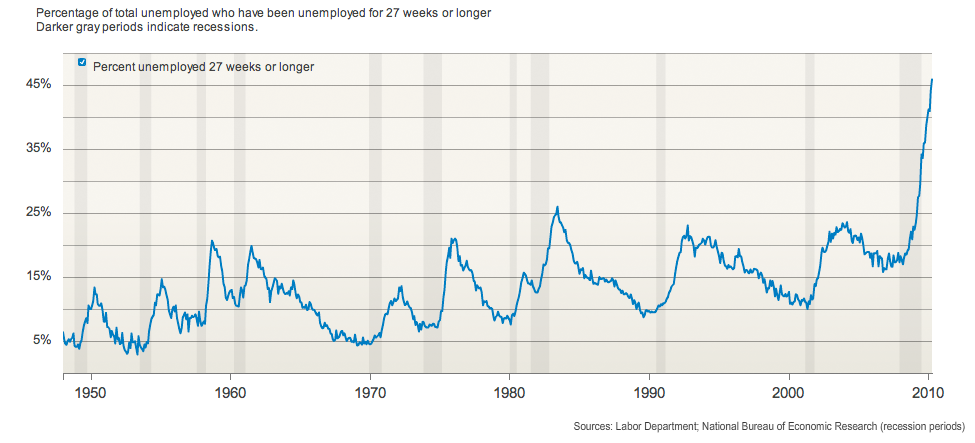Long-Term Unemployment at Highest Recorded Rate
This morning, another round of jobless benefits expired, with Congress away and hope of the approval of a new tier diminishing. And Sara Murray of The Wall
Jul 31, 202037K Shares1.2M Views
This morning, another roundof jobless benefits expired, with Congress away and hope of the approval of a new tier diminishing. And Sara Murray of The Wall Street Journal highlightsone of the worst facets of the unemployment crisis: Nearly half of the unemployed — 45.9 percent, or 7 million people — have been out of work for more than six months, the highest proportion since the Labor Department started tracking the statistic in 1948.
For every day a person is out of work, not only does he and his family suffer from the effects of lost income, but the chances of his finding work diminish. And, unusually in this recession, long-term employment has not just hit retirement-age or very young workers, but every demographic class.
The number of long-term unemployed persons poses a serious policy problem now, though one Congress seems to have answered: It will not extend unemployment benefits any longer than 99 weeks in some states, but will likely continue funding extended unemployment benefits as stimulus. But the issue will also pose a serious policy problem in the future: What will Congress do if, five years from now, with the recovery well underway, there remain millions of people who simply cannot find work? Job retraining programs and hiring incentives present one partial solution, but if Congress continues to tighten the nation’s fiscal belt, such expensive programs might not be politically feasible.

Dexter Cooke
Reviewer
Dexter Cooke is an economist, marketing strategist, and orthopedic surgeon with over 20 years of experience crafting compelling narratives that resonate worldwide.
He holds a Journalism degree from Columbia University, an Economics background from Yale University, and a medical degree with a postdoctoral fellowship in orthopedic medicine from the Medical University of South Carolina.
Dexter’s insights into media, economics, and marketing shine through his prolific contributions to respected publications and advisory roles for influential organizations.
As an orthopedic surgeon specializing in minimally invasive knee replacement surgery and laparoscopic procedures, Dexter prioritizes patient care above all.
Outside his professional pursuits, Dexter enjoys collecting vintage watches, studying ancient civilizations, learning about astronomy, and participating in charity runs.
Latest Articles
Popular Articles
